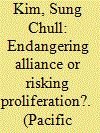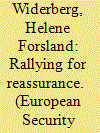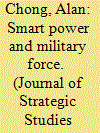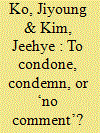|
|
|
Sort Order |
|
|
|
Items / Page
|
|
|
|
|
|
|
| Srl | Item |
| 1 |
ID:
153721


|
|
|
|
|
| Summary/Abstract |
This paper seeks to understand why the United States treated Japan and Korea differently in the revisions of bilateral nuclear cooperation agreements. On the sensitive issue of grating its allies the rights of developing enrichment and reprocessing (ENR), the United States did so for Japan in the 1977 and 1987 revisions, but did not for Korea during the 2015 revision. For the great power as a supplier state, there are two factors affecting the decision: policy-makers’ concern about alliance management prior to the calculation of security outcome, and firms’ commercial interests. In order to avoid damage to the US–Japan alliance and to maintain Japan's complementation for the US nuclear industry, Washington granted the rights of ENR to Tokyo. In contrast, because of its confidence of managing the US–Korea alliance and partly because of incompatibility of commercial interests between the two, Washington did not grant the rights to Seoul at the 2015 revision. Based on the comparison of the two cases, this paper underscores a need to alter the power projection theory regarding nuclear proliferation by explicating the alliance management as the ex ante element of power projection and by accounting for commercial interests such as fuel sale and technological partnership.
|
|
|
|
|
|
|
|
|
|
|
|
|
|
|
|
| 2 |
ID:
137404


|
|
|
|
|
| Summary/Abstract |
This article examines how allies who shared the same overall goal chose different tactics. It compares how Norway, Poland, and Lithuania pursued a strengthened emphasis on collective defense in the revision of NATO's strategic concept, which was adopted in 2010. In their efforts on influence the outcome of this process, the three allies made use of both bilateral and multilateral channels, but differed in terms of rhetoric, political access, use of media, and mix of national and alliance interests. The article finds that not only size, but also different levels of alliance maturity and diplomatic skills can explain the different tactics. As the study demonstrates, these differences not only create internal dynamics in the form of learning and division of labor, but they can also affect decision-making.
|
|
|
|
|
|
|
|
|
|
|
|
|
|
|
|
| 3 |
ID:
137254


|
|
|
|
|
| Summary/Abstract |
Smart power is comprised of two elements: the quest for building society among states and between states and non-state actors; as well as the desire for cleaner forms of power projection. This special issue explores how states continue to fumble over achieving the optimum mix of hard and soft power across several country cases and themed articles. This set of contributions suggests that smart power is not unlike a ‘Swiss Army Knife’ analogy: multifunctional and challenging to choose the right combination of ideational and material tools.
|
|
|
|
|
|
|
|
|
|
|
|
|
|
|
|
| 4 |
ID:
173899


|
|
|
|
|
| Summary/Abstract |
What explains a patron’s decision to publicly condone, condemn, or forgo commenting on its client’s unilateral provocations? We present a new theoretical framework that identifies a patron’s two strategic considerations – maximizing its sphere of influence and avoiding entanglement – and factors that affect them. We claim that whenever a patron faces a great power rivalry or a vulnerable client, it is more likely to condone its client’s provocations in order to safeguard its sphere of influence. On the other hand, when the risk of escalation looms large, the patron is more likely to condemn its client’s provocations in order to avoid entanglement. Focusing on the Sino-North Korean patron–client relationship, we test our theory on an original dataset that tracks China’s official reactions to provocations initiated by North Korea. We find that China tends to condone North Korea’s provocations when the USA criticizes them, and refrains from condemning when North Korea is domestically fragile. We also find that China is more likely to condemn its client’s provocations in the period after North Korea became a nuclear state. In addition, we draw on examples from the USA–Pakistan and the USA–Israel patron–client relationships to illustrate our causal logic. This article offers new insights on how a patron manages its client’s unruly behavior, and provides the first large-N evidence on China’s responses to North Korean provocations from 1981 to 2016.
|
|
|
|
|
|
|
|
|
|
|
|
|
|
|
|
|
|
|
|
|